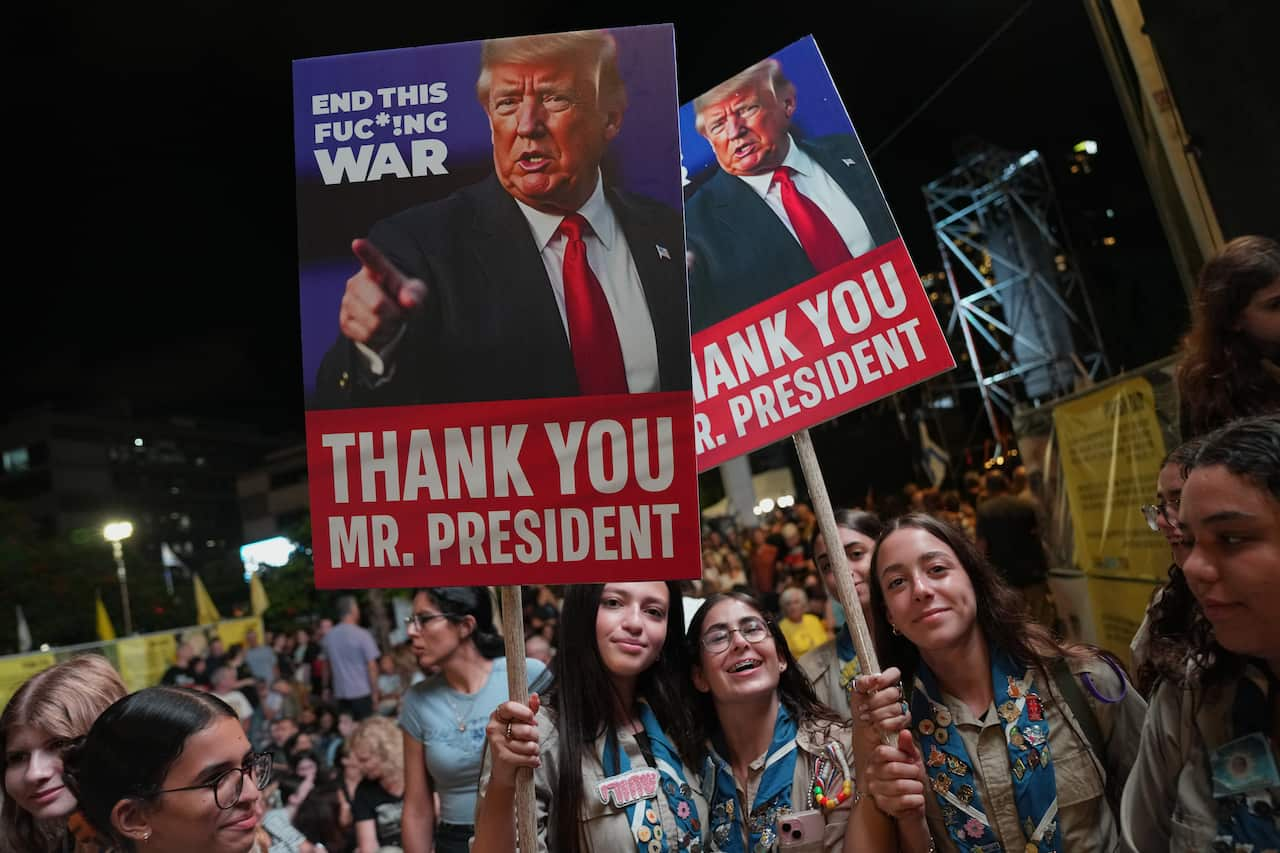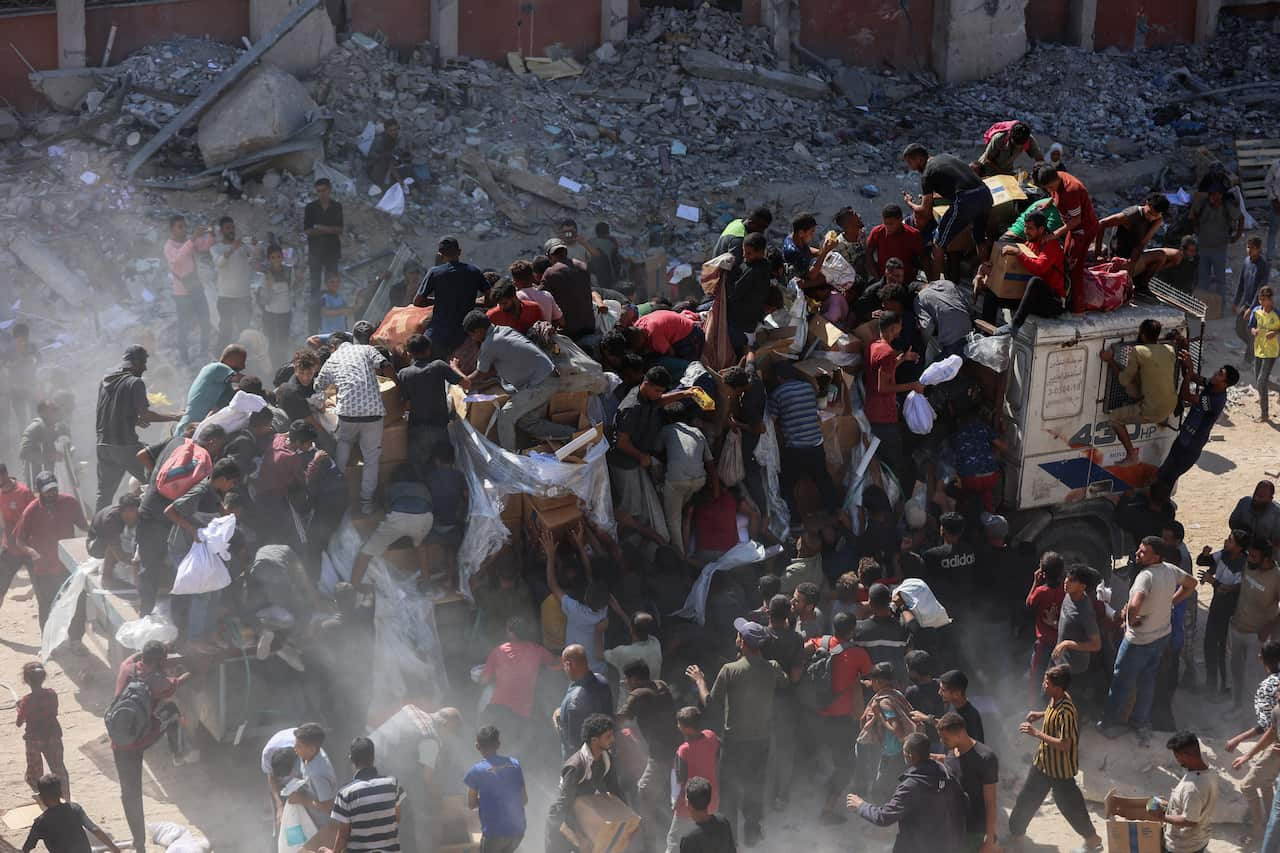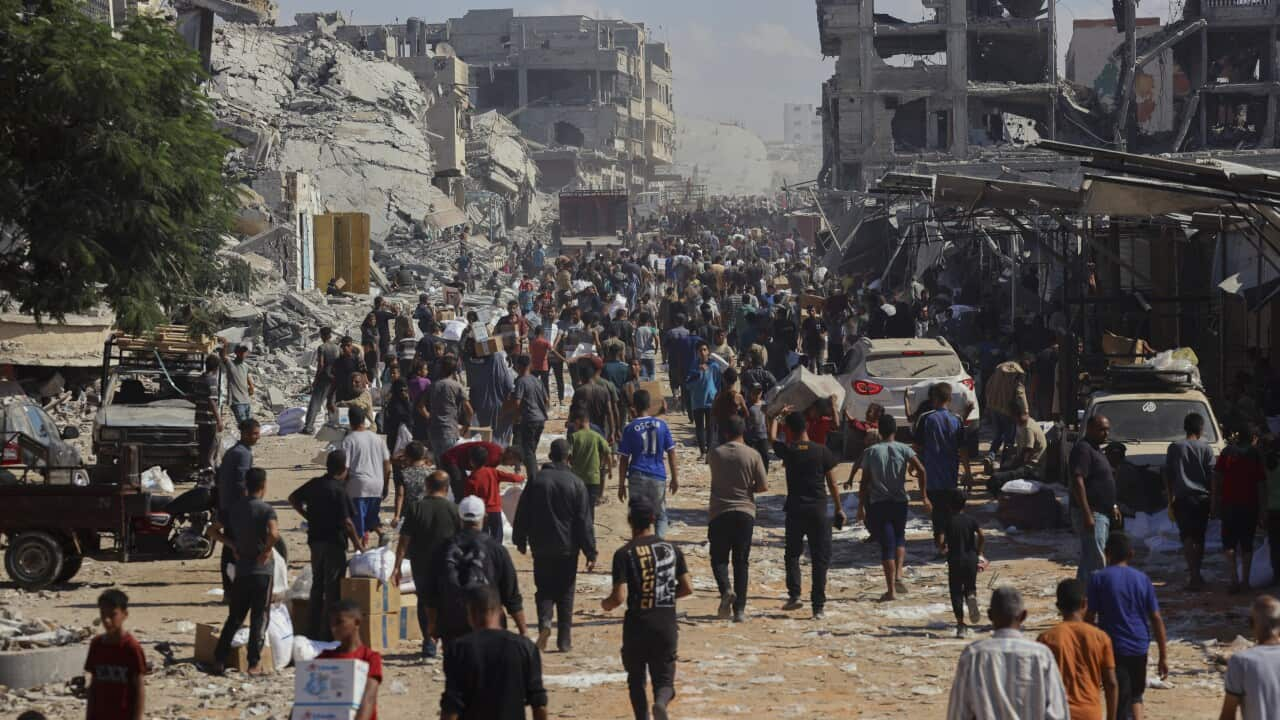This article contains references to suicide.
The war in Gaza has ended and the Middle East is going to "normalise," United States President Donald Trump said as he flew to Israel, which was waiting for Hamas to release Israeli hostages as world leaders gathered to discuss the next steps toward peace.
"The war is over, you understand that," Trump told reporters aboard Air Force One as he began a flight from Washington to Israel.
Asked about prospects for the region, Trump said: "I think it's going to normalise."
A ceasefire between Israel and Hamas held in Gaza for a third day on Monday AEDT ahead of the expected release of Israeli hostages and Palestinian detainees and prisoners, and a scheduled address by Trump to Israel's parliament.
Thousands of Palestinians continued to travel north towards Gaza City, the focus of Israeli attacks over the past two months, hopeful that the ceasefire would bring an end to the war.
“Tomorrow is the beginning of a new path. A path of building, a path of healing, and — I hope — a path of uniting hearts,” Israeli Prime Minister Benjamin Netanyahu said in a televised statement.
Such optimism was shared broadly.
"There is a lot of joy among the people," said Abdou Abu Seada, a resident of Gaza, who added that the joy was tempered by exhaustion after two years of war that has destroyed much of the Palestinian enclave.
Israeli government spokesperson Shosh Bedrosian said Israel expected the hostages to start being released early Monday morning local time, with the 20 living hostages to be released together. Israeli officials said they expect the hostage release to start around 2-3pm AEDT.
If hostages were released earlier, Israel was ready to receive them, Bedrosian said. Their release is to be followed later by the handover of the bodies of the remaining 28 deceased hostages.
Trump heads to Israel to address Israeli parliament
Under the ceasefire agreement, Hamas is due by noon on Monday to release the remaining hostages, taken captive on 7 October 2023.
Israel's hostages coordinator Gal Hirsch said last week a task force would be formed to help find the remains of any dead hostages that Hamas could not locate.

Trump is due to arrive in Israel on Monday to address the Knesset, the parliament, before travelling to Sharm El Sheikh in Egypt for a world leaders' summit on ending the Gaza war.
Palestinian Authority President Mahmoud Abbas will also attend the summit, an Axios reporter said, citing a senior Palestinian official.
US vice president JD Vance told NBC News Trump was planning to "greet the hostages Monday morning Middle Eastern time".
Gazans returning to north find devastation
The Israel Prison Service said it had transferred some Palestinian prisoners and those held in administrative detention to other facilities ahead of their expected release. The Israeli justice ministry has released the names of 250 Palestinians who are to be freed under the deal.
Israel is also to release 1,700 Palestinians who have been detained in Gaza since October 7, and 22 Palestinian minors, along with the bodies of 360 militants. Israeli government spokesperson Bedrosian said the prisoners would be released once the living hostages reach Israeli territory.
Israeli defense minister Israel Katz said once the hostages were returned, the military would destroy the underground tunnels in Gaza built by Hamas.
Palestinians returning to northern Gaza have described widespread devastation. Rescue workers warned there could be unexploded ordnance and bombs in the area.
Amjad Al Shawa, who heads a Palestinian organisation coordinating with aid groups, estimated 300,000 tents were needed to temporarily house 1.5 million displaced Gazans.
"We couldn't believe the destruction we have seen," Rami Mohammad-Ali, 37, said by phone after walking 15 km with his son from Deir Al Balah to Gaza City.
"We are joyful to return to Gaza but at the same time we have bitter feelings about the destruction," he said, describing seeing human remains scattered along roads.

Meanwhile, hundreds of humanitarian aid trucks have started entering the Gaza Strip from Egypt in accordance with the ceasefire deal.
Long lines of trucks carrying aid stationed in the Rafah area were starting to enter the Gaza Strip through the Kerem Shalom and al-Awja crossings, controlled by Israel, the Egyptian Al-Qahera News reported.
Israel mourns after October 7 survivor dies by suicide
Israel was gripped by sorrow and shock following the suicide of Roei Shalev, a survivor of the October 7 Hamas attack on the Nova music festival, in which his girlfriend was killed.
Shalev's body was found in his burned car north of Tel Aviv last week, hours after he had posted a message on social media expressing his intention to end his life.
"I cannot bear this pain anymore. I am burning on the inside ... I just want this pain to end," he wrote on his Instagram account.
Several secular opposition politicians — many of whom, unlike most ruling coalition members, remain active on social media during the Jewish Sabbath — reacted with dismay to the news on Saturday and called for greater mental health support for survivors of the October 7 attacks.
"It is time for the State of Israel to treat those suffering from mental health issues as heroes — not as statistics," Avigdor Liberman, leader of the hawkish Yisrael Beytenu party, wrote on X.
Shalev's girlfriend, Mapal Adam, and his best friend, Hili Solomon, were murdered before his eyes at the Nova music festival in southern Israel.
The three had been trying to hide under cars as Hamas-led militants launched their unprecedented assault on southern Israel.
Two weeks after the massacre, Shalev's mother also took her own life. According to Israeli media reports, she had been very close to Adam and was devastated by her death.
Readers seeking crisis support can ring Lifeline on 13 11 14 or text 0477 13 11 14, the Suicide Call Back Service on 1300 659 467 and Kids Helpline on 1800 55 1800 (for young people aged up to 25). More information and support with mental health is available at beyondblue.org.au and on 1300 22 4636.
Embrace Multicultural Mental Health supports people from culturally and linguistically diverse backgrounds.
For the latest from SBS News, download our app and subscribe to our newsletter.

